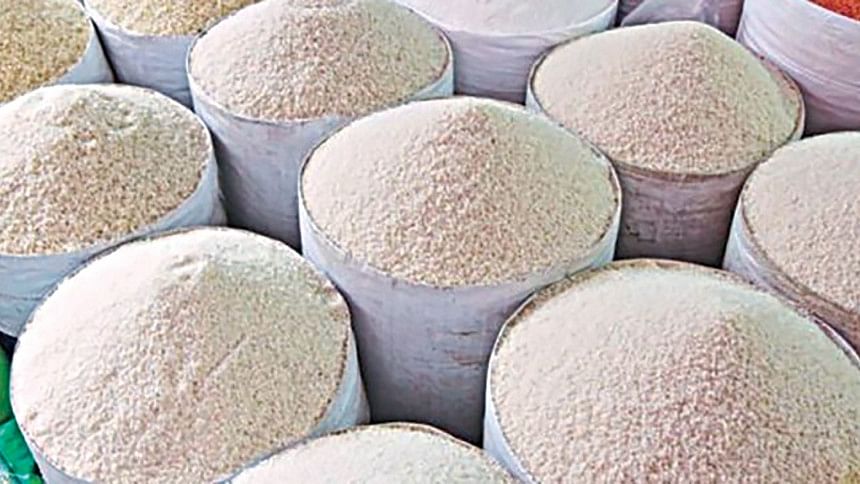‘No worries’ for next six months


Once the Boro harvest is completed across the country, the nation is unlikely to face cereal shortage in the next six months.
Analysing the food stock situation, experts said, by the time the current and upcoming stock of Boro would be consumed, in the next six months, Aman should be ready for harvest unless any natural disaster takes place.
But, they added, the main challenge for the government in coming days will be ensuring supply of other food items including fish, livestock and vegetables. Vegetables and fish farmers are already facing hard times as they are unable to sell their produce.
The prospect of a good harvest of Boro following an increased production of Aman, higher wheat imports and fairly a good food-grain stock in public godowns provide confidence that the country will be better off in terms of food availability during its war against the rogue Covid-19 pandemic.
Concerns, however, remain high regarding the risk of price spiral of the staple rice as the Boro prices are on the rise in the producing regions.
"We need not worry about food as we have enough food stock. We had 12.75 lakh tonnes of rice even before the start of Boro procurement. Now the procurement of both Boro and wheat has begun. So, no worries for few months," said Sadhan Kumar Majumder, the food minister.
This is only the public stock that the government uses for supporting economically vulnerable people. But the main stock remains with the farmers and others in private sectors. And this year, the Boro production was good, he said.
PUBLIC FOOD STOCKS
Until May 11, rice stock at public godowns was 9.97 lakh tonnes and wheat stock 2.82 lakh tonnes. The food ministry says the current food stock at public warehouses is "satisfactory".
The government started procuring paddy and wheat from April 26. The total target of procurement is eight lakh tonnes of paddy and 11.5 lakh tonnes of milled rice (parboiled and sunburnt).
The food department bought 104 tonnes of paddy and 826 tonnes of rice until May 11. Besides, it procured 15,280 tonnes of wheat against the target of 75,000 tonnes from this year's harvest.
The government has the capacity to store 19.3 lakh tonnes of food grains in its godowns. Besides the food stock, the market has seen quite good supply of rice.
BORO RICE
Farmers planted rice on 47.54 lakh hectares of land in the current Boro season, according to the Department of Agricultural Extension (DAE).
"Based on crop cutting data, it can be said that we will be able to achieve our Boro production target of 2.04 crore tonnes this Boro season," said Md Shahjahan Kabir, director general of state Bangladesh Rice Research Institute (BRRI).
"As we are going to have a good crop yield, we will have a stock of rice for the next seven to eight months. There will be no problem."
Boro accounts for more than half of annual rice production in the country.
In a report on Bangladesh last month, the US Department of Agriculture (USDA), also predicted higher Boro production this season, thanks to favourable weather and low pest infestation.
Besides, Kabir said, the agriculture ministry gives incentives during the coming season of Aus paddy.
The ministry last month declared Tk 9 crore of incentive to provide seed and fertiliser to small and marginal farmers to encourage cultivation during the Aus season. The government also reduced irrigation charge by half for the pumps owned by Bangladesh Agricultural Development Corporation.
Aus cultivation target has been raised to 13.26 lakh hectares in the coming season, 20 percent higher from the previous season. Aus production target has been set at 35 lakh tonnes, up from 27.75 lakh the previous year.
"We are also proceeding with good plan regarding Aman. Everything will be good if there is no natural calamity," said BRRI director general.
Boro is harvested in April-May period of the year and it accounted for 54 percent of total rice production at 3.64 crore tonnes estimated in fiscal 2018-19.
And the rain-fed Aman rice season brought 38 percent while Aus season contributed to the rest 8 percent to the annual rice basket.
And increased production helped the nation to largely cut dependence on imported rice.
Rice import tumbled 98 percent to 4,180 tonnes between July 1 and May 12 of the current fiscal year from 205,790 tonnes in the whole fiscal of 2018-19.
"We are self-sufficient in rice," he said. "With record production and harvesting of rice in every three months, there is no scope of famine in the country. The main task is to ensure access for all. At the same time, market should be monitored to curb price volatility."
As per the USDA data, with a production of 3.6 crore tonnes of rice Bangladesh stands in third position globally in rice production after China and India that produce 14.6 crore tonnes and 11.6 crore tonnes respectively. Earlier Indonesia was in third position, producing 3.49 crore tonnes of rice.
Agricultural economist MA Sattar Mandal said nearly two-third of rice would come safely if there is no unfavourable weather in the rest of the harvesting period.
"It appears that there would be good buffer," said Mandal, also a former vice chancellor of Bangladesh Agricultural University.
Quazi Shahabuddin, former director general of Bangladesh Institute of Development Studies (BIDS), said paddy farmers usually market 50-70 percent of total production of Boro.
So, from the production forecast, it appears that marketable surplus of the grain would be one crore to 1.40 crore tonnes, he said.
Mandal said focus should be given also on Aman as much as possible as the rain-fed rice crop is the second major crop after Boro. Aman accounts for 38 percent of the total yearly rice production.
HOW MUCH FOOD NEEDED
Asked how much food we need every year, Akhter Ahmed, agriculture researcher and country representative of IFPRI, citing USDA research said Bangladesh had a supply of 3.73 crore tonnes of food grains (rice and wheat) from May 2019 to last month.
As per the monthly statistics of United States Department of Agriculture (USDA) Bangladesh consumed total 3.58 crore tonnes of food grains in last one year, he said.
VEGETABLES, PROTEIN SOURCE
Asked about the food stock situation, Dr M Asaduzzaman, former research director of Bangladesh Institute of Development Studies (BIDS) said, once the Boro is harvested, the country would not face any food shortage at least for next six months.
So, the government now should concentrate on fixing the supply chains of vegetables and other food items, he said.
"Farmers are unable to send their vegetables to different parts of the country. The government should immediately fix it," added Asaduzzaman.


 For all latest news, follow The Daily Star's Google News channel.
For all latest news, follow The Daily Star's Google News channel. 



Comments